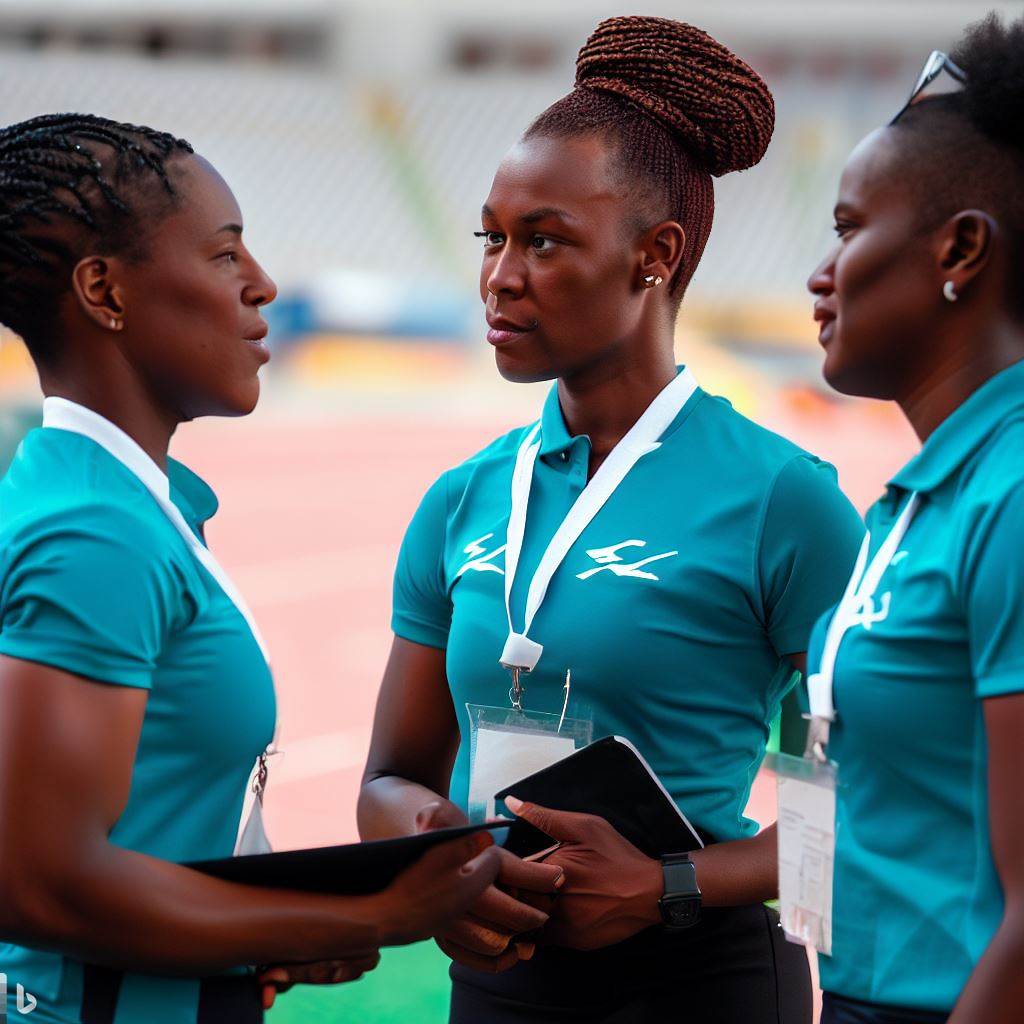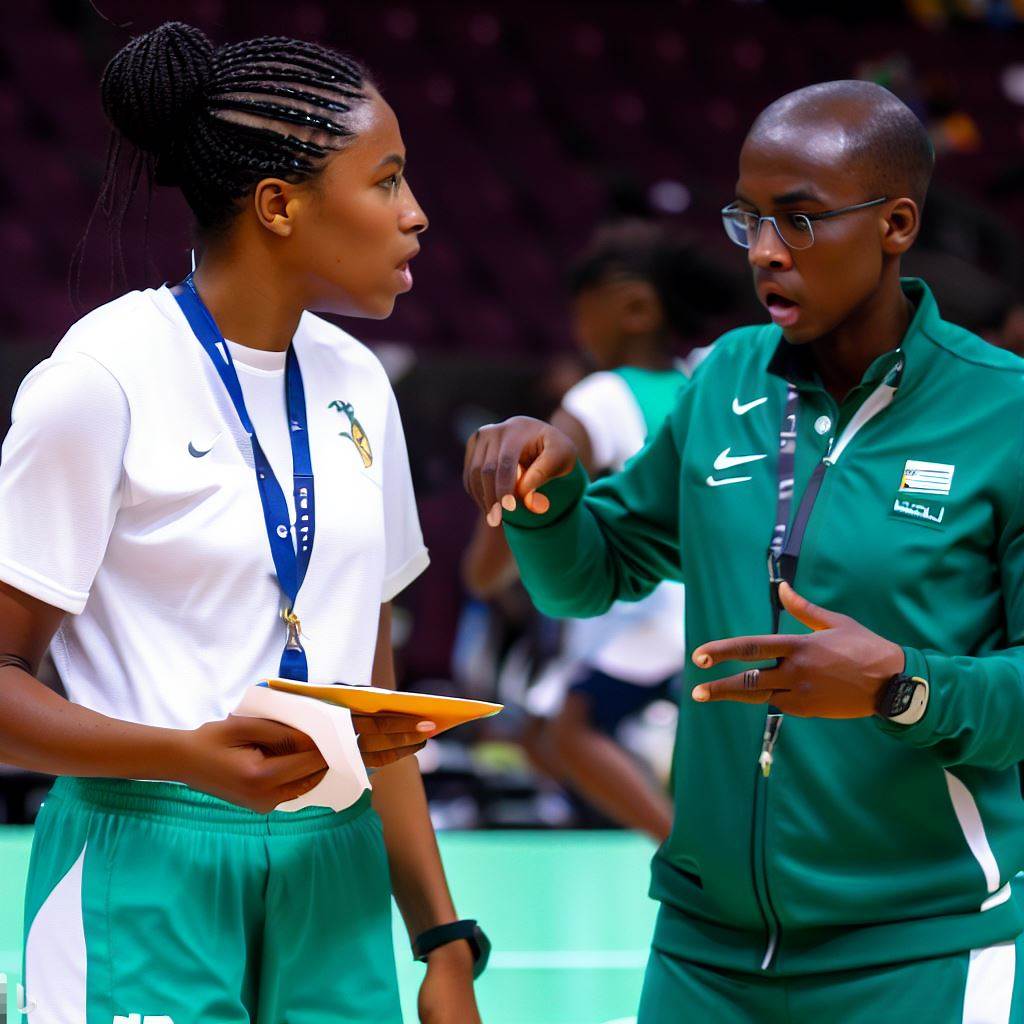Introduction
Let’s explore the networking in Nigeria for assistant athletic trainer tips.
In the realm of athletic training, networking holds paramount significance, fostering connections and collaborative endeavors. Within Nigeria, myriad networking avenues manifest in diverse forms.
This blog post not only delves into the significance of networking in athletic training and trainers tips but also elucidates the networking opportunities prevailing in Nigeria.
Networking plays a crucial role in athletic training as it provides opportunities for knowledge sharing, mentorship, and professional growth.
By connecting with colleagues, trainers can gain valuable insights and stay updated with the latest industry trends.
Moreover, networking allows athletic trainers to build relationships and establish a support system within the field.
Nigeria offers a range of networking opportunities for assistant athletic trainers to connect with professionals in the industry.
Conferences, workshops, and seminars are common platforms where individuals can interact, exchange ideas, and develop relationships.
Additionally, social media platforms such as LinkedIn and Twitter provide avenues for virtual networking and information sharing.
The purpose of this blog post is to highlight the significance of networking in the field of athletic training and shed light on the networking opportunities available specifically in Nigeria.
By understanding the importance of networking and being aware of the opportunities in Nigeria, assistant athletic trainers can enhance their professional development and expand their network.
In the next section, we will delve deeper into the benefits of networking in athletic training.
Benefits of Networking as an Assistant Athletic Trainer
Networking plays a crucial role in the professional growth and success of an assistant athletic trainer.
By building and nurturing professional relationships, expanding knowledge and skill sets, and opening doors for career growth and opportunities, networking provides numerous benefits.
A. Building professional relationships
- Networking allows assistant athletic trainers to connect with fellow professionals in their field.
- By attending conferences, seminars, and workshops, they can meet colleagues and industry experts.
- These relationships provide a support system where ideas, experiences, and advice can be shared.
- Collaborating with other professionals can lead to partnerships, referrals, and future career opportunities.
B. Expanding knowledge and skill set
- Networking exposes assistant athletic trainers to new ideas, techniques, and advancements in their field.
- Through conversations and discussions with colleagues, they can gain fresh perspectives and insights.
- Attending workshops and training sessions allows them to acquire new skills and stay updated with industry trends.
- Networking events often feature guest speakers who share their expertise and knowledge.
C. Opening doors for career growth and opportunities
- Building a strong professional network increases the chances of career advancement.
- Assistant athletic trainers who are well-connected may gain access to job openings before they are publicly advertised.
- Through networking, they can learn about potential career paths and explore new opportunities.
- Connections with influential individuals in the industry can lead to mentorship and sponsorship.
D. Gaining mentorship and guidance
- Networking allows assistant athletic trainers to connect with experienced professionals who can offer guidance.
- Mentors can provide valuable advice, share their experiences, and help navigate challenges.
- By establishing relationships with mentors, assistant athletic trainers can enhance their professional development.
- Mentors can also introduce their mentees to a wider network of influential individuals.
Most importantly, networking as an assistant athletic trainer offers numerous benefits, ranging from building professional relationships to gaining mentorship and guidance.
Transform Your Career in Nigeria
Discover unmatched expertise with our personalized Career Consulting service. Navigate Nigeria’s job market with a strategy tailored just for you.
Get StartedBy actively engaging in networking activities, such as attending conferences, workshops, and seminars, assistant athletic trainers can expand their knowledge and skill sets while opening doors for career growth and opportunities.
It is important for them to invest time and effort in maintaining and nurturing their professional network, as it can pave the way for their success in the field.
Read: The Economic Impact of Sports in Nigeria
Understanding the Nigerian Sports Industry
In order to effectively navigate the networking scene in Nigeria’s sports industry, it is crucial to have a comprehensive understanding of the industry itself.
This section provides an overview of the industry, highlights key stakeholders and their roles, explores the impact of popular sports, and identifies existing networking platforms and events.
1. Overview of the sports industry in Nigeria
- Nigeria has a vibrant and rapidly growing sports industry that encompasses various disciplines and levels of competition.
- The industry is fueled by a passion for sports, and it plays a significant role in fostering national unity and identity.
- From grassroots initiatives to professional leagues, Nigeria offers diverse opportunities for athletes, trainers, and sports enthusiasts.
2. Key stakeholders in the industry
- Athletes: The backbone of the sports industry, athletes showcase their talent and dedication through their performance.
- Sports Federations: These organizations govern specific sports and ensure the development and regulation of the respective disciplines.
- Sponsors: Commercial partners provide financial support and resources to athletes, teams, and events.
- Government: The Nigerian government plays a crucial role in providing infrastructure, policies, and funding for sports development.
- Media: Media outlets contribute to the industry by broadcasting events, promoting athletes, and generating public interest.
- Fans: Sports fans are a vital part of the industry, as their support and engagement drive revenue and create a vibrant atmosphere.
3. Popular sports and their impact
- Football: Undoubtedly the most popular sport in Nigeria, football unites the nation, inspires passion, and produces talented athletes.
- Basketball: The popularity of basketball continues to rise, with Nigerian players making waves in international competitions.
- Athletics: Nigeria has a rich history in athletics, producing world-class sprinters, long jumpers, and other track and field athletes.
- Boxing: Boxing has a dedicated following in Nigeria, and the country has produced renowned boxing champions.
- Other sports: Tennis, volleyball, wrestling, and other sports also contribute to the growth and diversity of the Nigerian sports industry.
4. Existing networking platforms and events
- Sports Conferences: These events bring together professionals, stakeholders, and enthusiasts to discuss industry trends, challenges, and opportunities.
- Sports Festivals: Festivals such as the National Sports Festival provide a platform for athletes to compete and connect with industry players.
- Training Camps: Various training camps and academies offer opportunities for athletes and trainers to network and improve their skills.
- Social Media Groups: Online communities focused on sports serve as networking platforms where individuals can connect and share insights.
- Industry Workshops: Workshops and seminars provide educational and networking opportunities for individuals interested in the sports industry.
Understanding the Nigerian sports industry and its key stakeholders, as well as being aware of popular sports and existing networking platforms and events, is fundamental for anyone aiming to build a successful network in this dynamic and vibrant industry.
Read: Influence of Sponsorship on Nigerian Athletes

Tips for Effective Networking as an Assistant Athletic Trainer in Nigeria
A. Attend Industry-Specific Events
- Research and identify relevant conferences, seminars, and workshops.
- Prepare a concise elevator pitch to introduce yourself.
- Actively participate in discussions and engage with professionals.
- Collect contact information and follow up after the event.
B. Leverage Social Media Platforms
- Create a professional profile on platforms like LinkedIn.
- Join relevant sports and athletic training groups.
- Share valuable content related to your field.
- Connect and communicate with industry professionals.
C. Seek Mentorship and Guidance
- Identify experienced trainers or industry veterans.
- Arrange coffee meetings or informational interviews.
- Ask for advice and guidance on career progression.
- Maintain regular contact and express gratitude.
D. Collaborate with Local Sports Teams
- Identify prominent teams or athletes in your area.
- Offer your services as an assistant athletic trainer.
- Attend games and matches to network with coaches and athletes.
- Demonstrate your expertise and build rapport with the team.
Read: Inspiring Stories of Successful Nigerian Athletes
Overcoming Assistant Athletic TrainerNetworking Challenges in Nigeria
In order to overcome the networking challenges in Nigeria, individuals must be aware of and address the following:
A. Language and Cultural Barriers
- Language diversity in Nigeria can make networking difficult due to communication challenges.
- It is important to learn and understand the local languages to connect with a wider network.
- Cultural differences can also hinder networking efforts, so it is crucial to be respectful and adaptable.
- Building relationships, showing genuine interest, and being patient can help bridge these barriers.
B. Limited Access to Resources and Opportunities
- Networking in Nigeria can be challenging because of limited resources and opportunities.
- It is common for individuals to lack access to the internet or professional networking platforms.
- Nevertheless, leveraging alternative methods becomes crucial in such circumstances.
- Attending local events, conferences, and networking through community organizations can help expand connections.
C. How to Adapt and Make the Most of Available Options
- Despite the challenges, it is possible to adapt and make the most of Nigeria’s networking landscape.
- Utilize social media platforms that are widely accessible, such as Facebook or LinkedIn.
- Join online communities and forums related to your field of interest or profession.
- Engage in discussions, share knowledge, and connect with like-minded individuals.
- Networking events and conferences provide opportunities to meet professionals from various industries.
- Prepare an elevator pitch and exchange contacts to establish a foundation for future networking.
- Become involved in local organizations, clubs, or associations relevant to your interests or career goals.
- Volunteer your time and skills to gain exposure and build valuable relationships.
- Networking doesn’t have to be limited to professional circles; building personal connections is also important.
- Attend social gatherings, music events, or cultural festivals to meet diverse individuals and expand your network.
In essence, although networking in Nigeria comes with language and cultural barriers, as well as limited access to resources and opportunities, individuals can adapt and make the most of the available options.
By learning local languages, attending local events, leveraging social media, and becoming involved in relevant organizations, one can overcome these challenges and build a strong network in Nigeria.
Read: Nigeria’s National Sports Policies: An In-Depth Review
Conclusion
Networking is crucial for assistant athletic trainers in Nigeria as it offers numerous benefits and opportunities.
By connecting with other professionals in the field, assistant athletic trainers can enhance their knowledge, skills, and career prospects.
It is essential for assistant athletic trainers to take proactive steps to expand their professional network, such as attending conferences and joining professional organizations.
Networking can provide a platform for sharing ideas, gaining mentorship, and accessing new job opportunities.
By building strong relationships with colleagues and mentors, assistant athletic trainers can receive valuable advice and support throughout their careers.
Furthermore, networking can open doors to collaborations, research projects, and speaking engagements.
Through networking, assistant athletic trainers can stay updated with the latest trends and advancements in the field.
Networking is a continuous process that requires effort and active participation, but the long-term benefits make it worthwhile.
Assistant athletic trainers can establish themselves as experts in the industry, build a solid professional reputation, and make a lasting impact.
In the end, networking is an indispensable tool for assistant athletic trainers in Nigeria, and it is encouraged to embrace opportunities to expand their network and reap the rewards.




